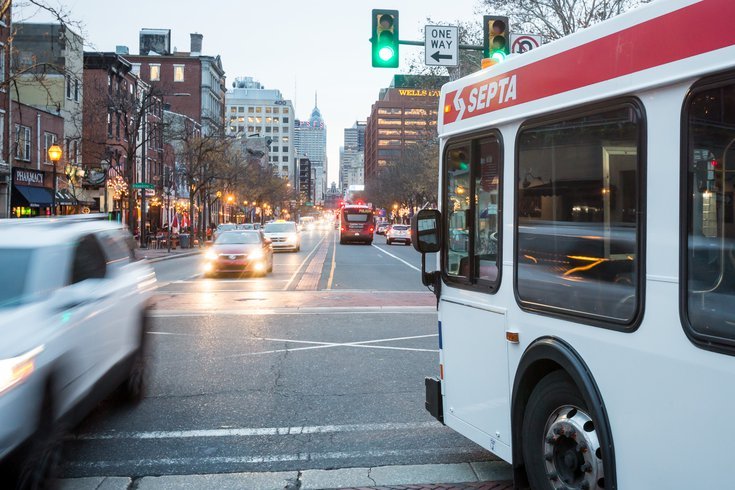
July 15, 2024
 Thom Carroll/for PhillyVoice
Thom Carroll/for PhillyVoice
The Federal Transit Administration conducted a safety inspection of SEPTA between August 2023 and January 2024. In a report released Monday, the agency issued directives for SEPTA to address its faltering safety record.
The Federal Transit Administration has ordered SEPTA to address safety issues inspectors observed during the agency's recent review of the authority's operations.
The FTA, which has federal oversight of SEPTA, conducted a safety management inspection last year after a string of crashes during a three-week period in July and August. SEPTA vehicles were involved in eight different crashes that resulted in one death and dozens of injuries. The incidents included a bus that struck a building in Center City, a collision between two buses in Northeast Philly and the derailment of a trolley that slammed into a building in Southwest Philly because its brakes weren't working properly.
The corrective action plan developed by federal regulators identified 16 problems that SEPTA must take measures to address by investing in its safety systems and training. The FTA's report noted that SEPTA transit operators face unsafe working conditions, are often overworked and don't have a strong enough culture around safety. The authority was told it needs to build "a more rested and engaged workforce" that consistently adheres to safety rules and procedures.
The FTA inspection looked at SEPTA's 126-route bus system, its two heavy-rail subway lines, six subway-surface trolleys in the city and two suburban trolley lines. Regional Rail was not included because it's overseen by the Federal Railroad Administration.
Over the last five years, the FTA said SEPTA has experienced "a deteriorating safety record" that has not significantly improved. In March 2023, the agency directed PennDOT to increase its oversight of SEPTA and to intervene to correct safety issues. The federal inspection found that in some areas, SEPTA has backslid since then and needs to increase its responsiveness to PennDOT's oversight.
During the period the FTA inspected, regulators determined SEPTA exceeded nationwide fatality and injury rates by significant margins on buses, subways and trolleys. SEPTA also had higher rates of derailment than the industry as a whole, the report found.
Regulators said violence, disorderly conduct and harassment targeting transit operators have a clear impact on the safety of SEPTA's transit system. Assaults on SEPTA workers — including both physical and verbal attacks — rose from 98 incidents in 2018 to an all-time high of 572 in 2023, according to SEPTA's logs.
"This situation has resulted in serious and worsening harm to workers, including injuries and fatalities," federal regulators said.
The report also found SEPTA has insufficient resources to implement safety recommendations and resolve known issues that would help prevent accidents. SEPTA’s overall safety staffing lags behind other systems of similar size and complexity, including transit authorities in Chicago, Atlanta, Boston and Washington, D.C.
A persistent shortage of transit workers — between 8-12% below budgeted levels — also causes excessive overtime that leads to fatigue and decreased alertness among operators, the report found.
In response to the report released Monday, SEPTA Board Chair Kenneth E. Lawrence Jr. said the safety and security of SEPTA customers and workers is the authority's "top priority."
“How we staff our operations, train our employees, and ensure the most effective policies are in place and followed all contribute to a safer SEPTA system," he said. "The FTA and PennDOT continue to have our full cooperation moving forward.”
SEPTA General Manager Leslie Richards said significant investments already have been made to address the concerns raised by the FTA. She credited a 37% decline in serious crimes on SEPTA during the first half of this year to increased transit police staffing and a new emphasis on quality of life issues that affect the system. SEPTA also pulled 9,500 workers from their regular duties last year to complete mandatory safety training courses.
SEPTA is the third major transit authority to be probed by federal regulators in the last decade. In 2015, the Metrorail in Washington, D.C. was taken over by the federal government for two years. Boston's Massachusetts Bay Transportation Authority was cited for more than 50 problems related to safety in 2022.
The FTA report on SEPTA safety comes amid a long-term funding crisis for the authority, which has depleted reserves from federal support during the COVID-19 pandemic. The state budget passed last week allotted $51 million in additional funding for SEPTA, but still leaves questions about how to close a $240 million deficit that transit advocates fear will result in service cuts and fare increases.
Richards said SEPTA will "embrace the opportunity" to work with the FTA and PennDOT to improve the authority's safety record.